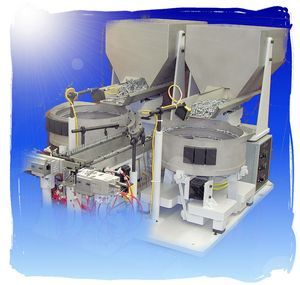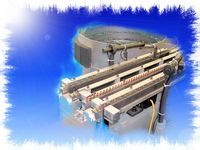VIBROMATIC REMAINS VIABLE PROVIDER OF PART HANDLING EQUIPMENT BY STAYING FOCUSED ON CUSTOMER DEMANDS
July 01, 2009 (PRLEAP.COM) Business News
Vibromatic emerges as a strong competitive part handling systems supplier focused on customer demands. Mr. Neal Graham, President of Vibromatic states that "you have probably heard more than one person say you get what you pay for. But he has a unique version of this when relating it to automation equipment, "you will get your monies worth when you purchase the latest technology, from a strong supplier at a competitive price". (For more information related to competitive pricing, refer to: http://pfbdirectory.com/What has contributed to Vibromatic remaining a leader during the worst economic downturn in four decades? Here are some of Mr. Graham's strategies that have kept Vibromatic out in front of some of the weaker competitors:
Mr. Graham states that "unfortunately, especially during this major economic downturn, there are some in industry that focus only on competitive price and allow sub standard equipment to reach assembly floors for operators and production personnel to struggle with. (For Part Handling Systems Specifications, go to http://aboutparthandlingsystems.com/)
There was a time when this approach would work for machine builders and feeder companies. A time when buyers of automation equipment were unsophisticated and really didn't know what they wanted and didn't understand a whole lot about what they were getting.
There has been a different trend over the past decade. Today, many buyers know what they want and how to specify it. (For to vibratory feeders go to: http://phsdirectory.com/
Ironically, the machine builders and part handling suppliers that are consistently low bidders have been the first to either get into financial trouble or go out of business.
During this economic downturn we are sure to see the survival of the manufactures of automation equipment that prove to meet the strict requirements of industry. The ones that fail to comply with industry demands for the sake of cutting cost will vanish from the scene and no longer be players in a fast changing industry.
Probably every segment of industry went through some type of change over the past decade. The automotive industry has been shaken to its roots by foreign competition. The electronics industry seems to be dominated by foreign markets.
Without being quite as obvious and not receiving nearly as much publicity, the automation industry has also seen some dramatic changes. There have been times that the machine trade thrived on tremendous capital expenditures by the manufacturing industry. Machine builders that once could survive on an industry willing to accept new technology built to a mixed bag of techniques seen a trend that required them to comply with more rigid specifications as a greater segment of the manufacturing industry became more demanding.
There were some machine builders that complied with specifications and maintained their R&D efforts to meet the stricter requirements only to cut costs in other areas for their competitors. And, the ones that allowed R&D programs to suffer to be the first to see financial woes leading them to cut back further and business due to their bad reputation.
The trend to adhere to rigid specifications also trickled over into other elements of the machine building industry including feeder companies that design and build part handling systems.
These specifications were geared not only to improve reliability but to enhance operator efficiency and comply with hazardous and environmental issues.
These new requirements called for features such as higher levels of efficiency, quicker changeovers for handling a greater variety of parts to meet JIT requirements, maintaining acceptable sound level environment for operator safety, higher feed rates, new products to meet a growing market, and techniques to aid maintenance personnel.
Change effecting feeder companies is two fold. One being the number of competitors that have appeared on the scene, the other being the trend to cut R&D costs to compete. As a result, there has been a number of weak, low cost providers emerge.
Mr. Graham being a strong believer in quality at a competitive price states that "Feeder companies that were willing to reinvest in R&D to develop new products and methods are the ones that are in the best position to meet current demands of the automation industry and that some of the smaller and less sophisticated feeder companies have remained stagnant by producing only a certain type system rather than diversify and reinvent themselves to react to the current needs of a very demanding manufacturing industry.
The more aggressive manufacturers of feeding equipment have also resisted the trend among the less sophisticated to gain competitive advantage by designing cheaper and less reliable components into their equipment along with reluctance to reinvest in R&D.
Ironically, feeder companies that have failed to meet industry standards, even though they may consistently be the low bidder have went out of business or are struggling to remain in business while the ones that have kept pace with industry's demands by maintaining quality are flourishing.
Vibromatic's goal, as Mr. Graham explains, "is to remain a viable provider of part handling equipment by reinvesting money in looking for better methods. We want to be viewed as more than just a vibratory bowl company. We want to be identified as a Part Handling Systems supplier focused on responded to customer demands. We pour the horsepower to arrive at the best answer to the problems on every project that requires custom design and build".
Mr. Graham sums this up by stating "feeder companies are part of an industry that is highly competitive and always looking for ways to under-bid the competition. The temptation is constantly there to cut R&D costs in some way, however the ones that are willing and have the capability to comply with industry standards and provide the highest level of technology for an affordable price will be the part handling suppliers of tomorrow".


